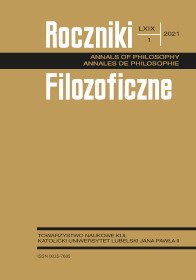No Work for a Theory of Personal Identity
Abstrakt
A main element in Richard Swinburne’s (2019) argument for substance dualism concerns the conditions of a person’s continued existence over time. In this commentary I aim to question two things: first, whether the kind of imaginary cases that Swinburne relies on to make his case should be accorded the kind of weight he supposes; and second, whether philosophers should be concerned to give any substantial theory, of the sort that dualism and its competitors are apparently meant to provide, to explain the conditions of personal identity after all. My suggestion, instead, will be that the concept of a person’s continued existence is better taken as philosophically unanalyzable.
Bibliografia
Foot, Philippa. (2002). “The Problem of Abortion and the Doctrine of the Double Effect.” In Virtues and Vices and Other Essays in Moral Philosophy, 19–32. Oxford: OUP, 2002.
McDowell, John. “Reductionism and the First Person.” In Reading Parfit, edited by Jonathan Dancy, 230–50. Oxford: Blackwell, 1997.
Swinburne, Richard. Are We Bodies or Souls? Oxford: OUP, 2019.
Thompson, Evan, and Diego Cosmelli. “Brain in a Vat or Body in a World? Brainbound Versus Enactive Views of Experience.” Philosophical Topics 39, no. 1 (2011): 163–80.
Williams, Bernard. “The Self and the Future.” Philosophical Review 79, no. 2 (1970): 161–80.
Copyright (c) 2021 Roczniki Filozoficzne

Utwór dostępny jest na licencji Creative Commons Uznanie autorstwa – Użycie niekomercyjne – Bez utworów zależnych 4.0 Międzynarodowe.





